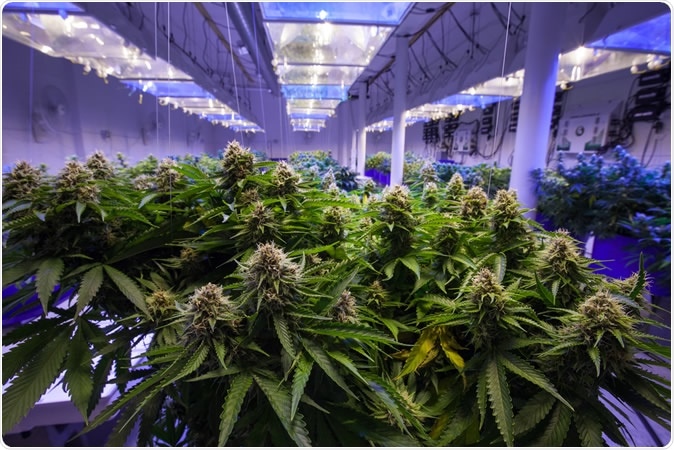Marijuana can help reduce the pressure inside the eye (IOP, or intraocular pressure). Being a euphoric drug, it is now a commonly used recreational and medicinal drug. In fact, its use ranks fourth among all substances, behind tobacco, alcohol and caffeine.
In 2008, Michigan voted in the Michigan Medical Marijuana Act (MMA) to allow certain medical indications for marijuana. Since then, the state has also legalized recreational marijuana. Currently medical marijuana is legal in 23 states of the USA.

Commercial Marijuana. Image Credit: Canna Obscura / Shutterstock
The MMA allows marijuana to be prescribed to alleviate certain debilitating conditions.
To qualify, a medical condition should have one or more of the symptoms listed below:
Citing the MMA, some patients with glaucoma have switched to marijuana instead of medication. Is this doing them good?
What is glaucoma?
Glaucoma is an ocular disease that weakens the optic nerve, progressively narrowing the field of vision, and often ending in legal permanent blindness. It is the Number 1 cause of blindness in the US African-American population, and second overall.

Acute angle glaucoma on right eye. Credit: Ittidech / Shutterstock
There are three types of glaucoma:
- Open-angle or chronic glaucoma: this condition develops slowly and is not usually painful, but ends in vision loss. It can be treated medically or surgically. Prescription eye drops approved by the US Food and Drug Administration can give long-term effective relief if properly used.
- Closed-angle or acute glaucoma: this refers to acute increase in IOP, occurring over hours to days. It can cause severe but treatable pain and nausea, and is not really a debilitating condition.
- Secondary glaucoma: this refers to a rise in the IOP due to an underlying condition. It includes both types of glaucoma.
Glaucoma can be treated medically and surgically.
Why marijuana for glaucoma?
Under federal regulations, marijuana is a Schedule 1 controlled substance. It is therefore, by definition, liable to abuse. Its use as medication has not been accepted as it a safe and well-researched alternative to any accepted medical treatments, including for glaucoma.
In a new blog post Michigan Medicine ophthalmologist, Theresa M. Cooney, M.D. points out the lack of research on combining traditional medications with marijuana, as well as the increased side effects linked to high doses of marijuana.
Marijuana itself is not a standardized preparation, with different samples showing a very wide divergence between the types and amounts of various cannabinoids. There are more than 400 different compounds in marijuana, not counting drugs added to it to increase the euphoric effect. With their wide range of bioactivity and toxicity, these could cause significant health effects.
Marijuana actions in the body
Cooney sayst that marijuana does reduce the IOP by about a quarter in 60-65% of people, with or without glaucoma. The IOP remains low thereafter for 3-3.5 hours.
Tetrahydrocannabinol (THC) is among the most active ingredients of marijuana, and is nontoxic to the lungs. Though supposed to help in glaucoma, its long-term ocular effects are unknown. Its poor water-solubility precludes topical application. Oral formulations have poor absorption profiles, making their effects unpredictable.
Glaucoma eye drops have a better and more sustained action than marijuana. In fact, the latest glaucoma medications act for up to 8 hours after a single use. Cooney remarks, “You’d need to smoke eight to 10 marijuana cigarettes a day for them to have the same effectiveness as regular, glaucoma drops.” This is about 3,000 to 3,500 marijuana joints a year.
But besides the IOP, marijuana reduces the blood pressure, endangering the weakened optic nerve. Blood pressure typically falls in about 1 hour, but more quickly (15 minutes) in hypertensive patients with postural hypotension. This could cause symptoms like dizziness and fainting. In fact, marijuana causes palpitations within just 3 minutes, typically lasting an hour or two.
It also causes psychotropic effects, like euphoria, dysphoria, and short-term forgetfulness. As a result, users cannot drive, use heavy machinery or do intense mental work until it has worn off.
Marijuana cigarettes are unfiltered, exposing the lungs to higher amounts of tar, carcinogens, and irritant chemicals compared to tobacco. Long-term use can cause lung disease similar to emphysema, and cancer.
Other effects include hormonal abnormalities and higher miscarriage risk, impaired concentration, poor coordination, low immunity and addiction.
Ocular effects include decreased production of tears, redness, impaired far vision, double vision, and light hypersensitivity. Twitching or spasm of the eye muscles may occur.
Summing it up, Cooney says she believes that available evidence doesn’t really make marijuana a better choice for glaucoma in any way. She concludes, “Based on reviews by the National Eye Institute and the Institute of Medicine and on available scientific evidence, the Task Force on Complementary Therapies believes that no scientific evidence has demonstrated increased benefits and/or diminished the risks of marijuana usage to treat glaucoma compared with the wide variety of pharmaceutical agents now available. But there’s still much more to explore with the help of future studies.”